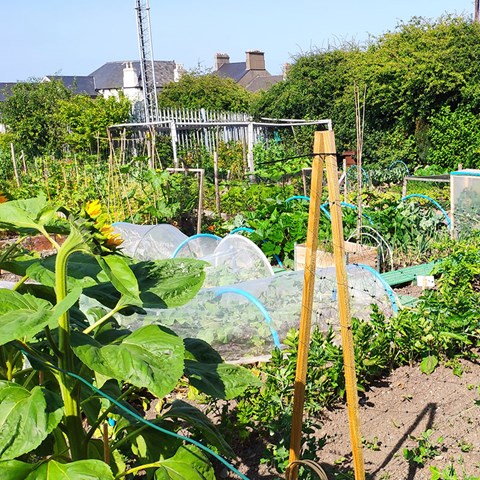Anke Brons and Koen van der Gast from Wageningen University presented their research paper A tale of two labs: Rethinking urban living labs for advancing citizen engagement in food system transformation, published in Cities in 2022. This was followed by a panel discussion between researchers from SLU, Amsterdam Institute for Advanced Metropolitan Solutions, RUAF Global Partnership, Wageningen University, Yale University and University of Plymouth.
What is an urban living lab? The case of Almere
The living lab presented by Anke and Koen is based at a research site in the city of Almere, the Netherlands. The specific site of this lab is interesting for looking at questions of inclusivity and food systems transformation for two main reasons. The first is that historically, the city of Almere has been designed to connect its food producing rural hinterlands to the food consuming urban centres; and the city positions itself as a city that wants to stimulate sustainable and healthy food environments. Secondly, Almere is a place of socio-economic and cultural diversity, with a large immigrant population, making the question of inclusion in food systems transformation very relevant.
Living labs, as expressed in the research paper, are sites that actively engage citizens in methodological test-beds or experiments within real-world settings. In this respect, living labs look for solutions to local problems by understanding how neighbourhoods function through community engagement. There are many different forms of living labs but they are all connected through a focus on citizen engagement, which can be done in different ways.
Two types of living labs or stages in a cyclical learning process?
The authors discussed the two types of living labs identified in the study in Almere. The first looks at ‘Living labs as daily life’, which tries to understand what kind of food practices happen in everyday life by looking at the day-to-day activities of participants. The lab includes a broad spectrum of participants from different socio-economic backgrounds to build an understanding of what people are already doing in their everyday lives around food, health and sustainability; to acknowledge a multiplicity in performances and understandings that is happening in a real-life setting.
The second type of living lab is positioned as a ‘break from daily life’, which asks people to step out of their daily context and food practices to reflect upon what is happening and what could be done differently. This form of living lab is said to have a future orientation that focuses on how to reshape alternative food futures.
The authors and panelists reflected that although the paper identifies two forms of living labs, they can also be understood as stages in long-term, iterative processes in food system engagement. The living lab process can be seen as cyclical in nature, where learning continuously takes place in terms of understanding citizen engagement, changing food practices, and the policy implications of these interactions.
Reflecting upon inclusivity and citizen engagement
There is a limited reach of citizen engagement in processes of food system transformation in terms of breadth and depth. In other words, ‘who’ is involved in food system transformation in terms of different socio-economic, ethnic and cultural backgrounds; and also limited understanding of ways that citizens are involved in their diversity of roles in the food system, not just as consumers but also as producers and agents in making food futures.
The authors emphasised that the paper differentiates living labs from participatory and democratic processes because the different stages of the lab places citizens as subjects and participants rather than as decision-makers. The panel reiterated that when living labs are designed and implemented it is critical to think about the role of the lab technician and the researchers in facilitating the lab, which has consequences for how participants are selected and engaged. When considering aspects of inclusivity it is important to think about who is invited, who is enabled but also who is empowered to speak, and who is making the decisions.
The webinars and panel discussion highlighted that living labs offers tools for understanding citizen engagement in local food systems within a given geographical context. Given the difficulties in facilitating greater inclusion in urban food policy-making, living labs demonstrate ways to intentionally design participatory processes that are out-come orientated and create real-life solutions. By engaging people in everyday practice, living labs offer insights into understanding how communities can collectively shape urban food environments and therefore offer potential solutions to transform our societies.
See the recording of the webinar here (YouTube)
